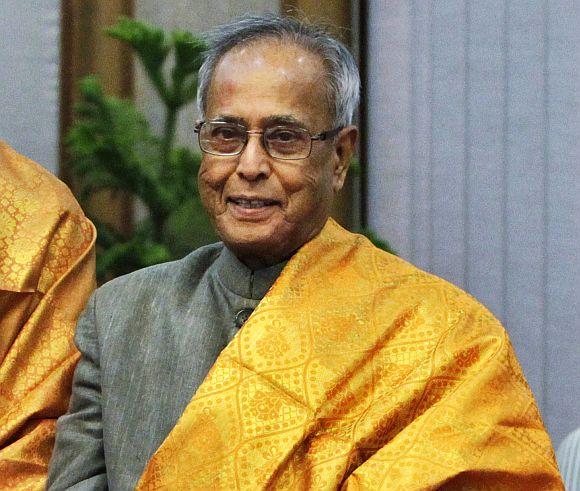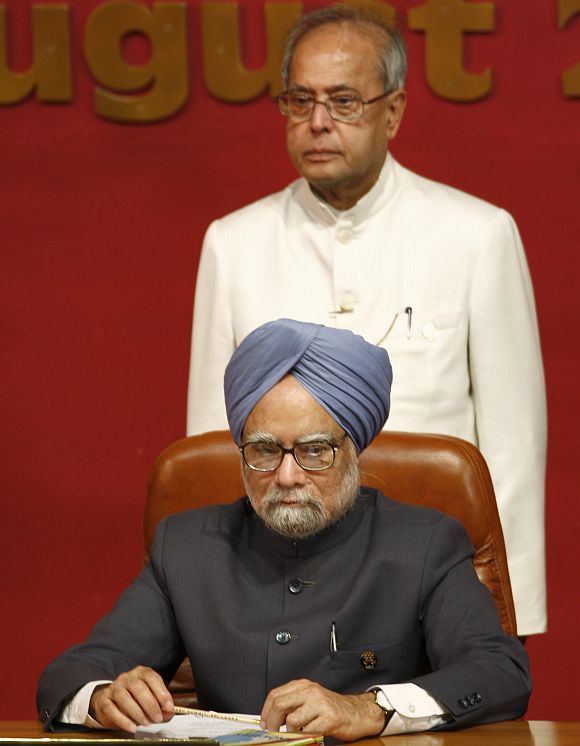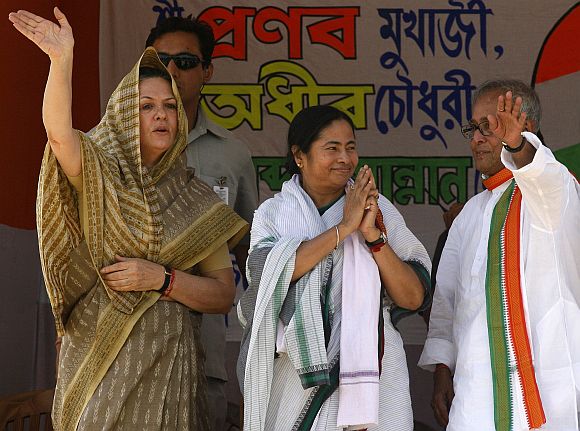Photographs: B Mathur/Reuters Shreekant Sambrani
Despite a middling career in politics, Pranab Mukherjee has endured because of his reputation as a political troubleshooter par excellence.
It is all over bar the shouting, as the cliche goes. Unless the equivalent of a meteor strike occurs in the Indian polity in the next few weeks, Pranab Mukherjee will address the nation from the Rashtrapati Bhawan on the eve of the coming Independence Day.
Most Indians would be relieved at this development not so much because Mukherjee is the most desirable person to head the Republic, but because we can put behind us the atmosphere of plots and conspiracies that preceded the announcement of the United Progressive Alliance's candidate for presidency.
The theatricals that followed it might have made for mildly thrilling television viewing, but were poor examples of realpolitik.
The general tendency to salute the rising sun would now cause an outpouring of homilies about Mukherjee's well-deserved rise to the highest position in the country and his many sterling qualities that earned him the reward. Some detached analysis of his career should, however, make us concur with Pratap Bhanu Mehta when he said recently that "political characters become cardboard cut-outs of virtues and vices".
Please ...
He has lately been seen as de facto prime minister
Image: Mukherjee stands behind PM Singh during the 2008 SAARC summit in ColomboPhotographs: Reuters
Mukherjee first held a ministerial office in 1973 as deputy minister in charge of industrial development. He has held many different positions over the four decades since then -- except for the first four years of the Rajiv Gandhi era that he spent in virtual wilderness -- mostly in economic areas.
He has lately been seen as de facto prime minister not only during Manmohan Singh's travels abroad, but also during the latter's long periods of silence.
His diversions into defence (2004-06) and external affairs (1995-96 and 2007-09) were unremarkable. Even though India signed the nuclear agreement with the United States when Mukherjee was the external affairs minister in 2008, the credit for that feat is rightly attributed wholly to Singh.
Mukherjee's initiation into economic affairs coincided with the height of Indira Gandhi's power. Policy-making then was bereft of vision and by exception.
Many measures and specific ones in his stints -- first as commerce minister and later as finance minister in the 1970s -- were seen to have favoured the protean Ambani enterprise, as exposed by Arun Shourie and S Gurumurthy.
His budgets of that period came to be associated with industry- or activity-specific incentives and deterrents, rather than broad policy measures, a trait that was again evident in his recent tour of duty as finance minister in 2009-2012.
P V Narasimha Rao appointed Mukherjee the deputy chairman of the Planning Commission in 1991, but the momentous policies of those early days of economic liberalisation all came from the then Finance Minister Manmohan Singh with Rao's blessings.
When Singh offered to resign in 1993 following the Harshad Mehta scandal, Rao reached out to I G Patel and not Mukherjee as a possible replacement.
Pranab leaves behind a legacy of a floundering economy
Image: Finance Minister Mukherjee smiles as he leaves his office to present the 2012/13 budget in New DelhiPhotographs: Vijay Mathur/Reuters
Mukherjee's present stint as finance minister (he is supposed to have asked for the portfolio in UPA-II) has culminated into the retrogressive budget of FY2013 that is based on hopelessly unrealistic presumptions.
He leaves behind a legacy of a floundering economy with slowing growth, falling investment and widening budgetary and current account deficits. Not to mention the rupee that is experiencing a free-fall unmatched by any other emerging market currency.
The front-page graphic in this newspaper "Mukherjee's legacy" (Business Standard, June 16) and the 200-plus point rise in the Sensex after learning of Mukherjee's imminent departure from the North Block speak more eloquently about his performance than any verbal analysis.
Mukherjee is considered a politician's politician and has been the leader of the house in Lok Sabha since 2004. Although he entered the Rajya Sabha in 1969, 2004 was the first year in which he was in the Lok Sabha, thanks mainly to the accommodation shown by the West Bengal Left Front. (Could that be the cause of Mamata Banerjee's smouldering ire against him?)
He had never won a general election before and used to be considered unelectable, much like Singh. It was his conciliatory skills and his ability to talk around (never about) any problem to various people that came in useful to a Congress leadership divided between an unapproachable but all-powerful president and a titular but mainly ineffective prime minister, especially in the more turbulent period following the withdrawal of the Left support in 2008.
A political troubleshooter par excellence
Image: Pranab Mukherjee with Congress president Sonia Gandhi and Trinamool chief Mamata Banerjee during a rally in Lalgola.Photographs: Jayanta Shaw/Reuters
I have my own account of the Congress man of all seasons and reasons. I went to Manipur as part of an advisory team from the Indian Institute of Management, Ahmedabad, in August 1978. I landed in Imphal on a Sunday afternoon. The airport and the parking lot were largely deserted.
A small, trim, dhoti-clad figure approached the only government car parked there. I heard the driver tell him that it was for some professor from Ahmedabad and not any Mukherjee from Delhi (the Congress state government had almost overnight changed its shingle to Janata following the Congress defeat in 1977). I offered him a ride to the circuit house where we were both staying.
We engaged in a brief conversation centred on our then common weakness for smoking pipes.
No one received him at the circuit house either. But at about 5 pm, I saw people trickling in to see him. Soon there was a mountain of shoes outside his door. The pattern repeated over the next two days -- no visitors in the day, followed by a flood after dusk.
I wondered about it for some time and then put it out of my mind. The penny dropped later in the year when I read that Yangmasho Shaiza, the chief minister of Manipur, had "returned home" to the Congress, with his following intact.
This is what has made Mukherjee's reputation as a political troubleshooter par excellence and made him survive in the rough and tumble of Indian politics for so long.
Even though Sonia Gandhi did not trust him sufficiently to take him along to see President A P J Abdul Kalam on that fateful day in May 2004, she has now brought him to the threshold of being Kalam's successor once removed.






article